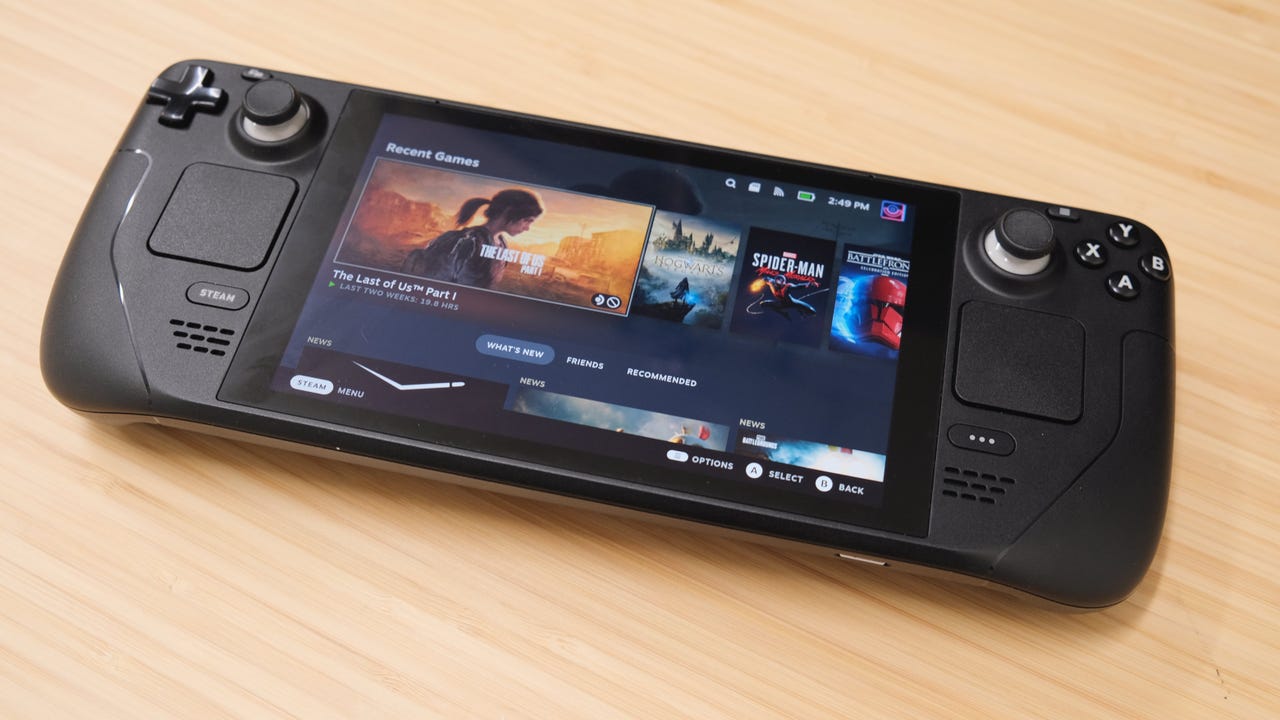'ZDNET Recommends': What exactly does it mean?
ZDNET's recommendations are based on many hours of testing, research, and comparison shopping. We gather data from the best available sources, including vendor and retailer listings as well as other relevant and independent reviews sites. And we pore over customer reviews to find out what matters to real people who already own and use the products and services we’re assessing.
When you click through from our site to a retailer and buy a product or service, we may earn affiliate commissions. This helps support our work, but does not affect what we cover or how, and it does not affect the price you pay. Neither ZDNET nor the author are compensated for these independent reviews. Indeed, we follow strict guidelines that ensure our editorial content is never influenced by advertisers.
ZDNET's editorial team writes on behalf of you, our reader. Our goal is to deliver the most accurate information and the most knowledgeable advice possible in order to help you make smarter buying decisions on tech gear and a wide array of products and services. Our editors thoroughly review and fact-check every article to ensure that our content meets the highest standards. If we have made an error or published misleading information, we will correct or clarify the article. If you see inaccuracies in our content, please report the mistake via this form.
Valve's Steam Deck turned this 40-year-old dad into a gamer again

I grew up playing video games on various gaming systems. I got my first console for Christmas when I was in first grade. It was the original Nintendo Entertainment System that came with Super Mario Bros. My brother and I shared it, along with the frustration that came with fighting Bowser and trying to rescue the Princess.
After that, the timeline gets a little fuzzy, but eventually we also shared Game Boy, a Nintendo 64, a Sega Genesis, and probably a few more consoles along the way. We'd rent video games from Blockbuster or the local video store, and sometimes forget to return them.
Also: How to build a gaming PC for $550
As I got older, I bought my own console and spent many hours trudging through Halo, Call of Duty or throwing touchdown passes in the latest Madden.
Eventually, I got married and had kids. And it wasn't until the latter part of that equation that the spare time I previously used for gaming faded away, replaced by parenting duties and building my career (which meant no more staying up to 2 a.m. playing "just one more match").
Admittedly, being a parent didn't stop me from buying every new Xbox, building a couple of gaming PCs, and even scooping up every Nintendo Switch model released in an attempt to reinvigorate my passion for gaming.
Also: Game console showdown: PS5, Xbox, and Nintendo compared
But, it never lasted. My Xbox Series X is covered in dust. My Switch hasn't been charged in a couple of months, and my gaming PC is most often used for traditional computing tasks. I even spent years reviewing gaming laptops for another publication, but that was work and not play, and nothing I pursued when I was done with the review.
Early Steam Deck impressions were not good
When Valve announced the Steam Deck, a portable gaming handheld that's capable of running PC games, I read a few reviews and immediately wrote it off as a device that wasn't for me.
Early reviews often talked about having to mess with experimental Proton files and adding launch commands in order to even get a game to launch, and then there were further changes needed in order to get playable performance.
If I was going to, once again, try to start regularly gaming, I wanted it to be on a device that I didn't have to put effort into getting games to work. I wanted to click a button and a few seconds later be inside a make-believe world.
Also: The best gaming PCs right now
But every few months or weeks, I'd check in on the status of the Steam Deck. Valve was releasing a steady stream of updates to Steam OS, its operating system, and it seemed that game developers were slowly adopting and adapting their games.
I'm gaming again
And then last November, as my 40th birthday approached, I was asked to create a birthday gift list. I was told to think big. Apparently turning 40 is a major milestone.
One of the last things I put on my list, as more of yeah, right option, was a Steam Deck. I wasn't convinced it was worth spending my money on it, but if someone bought it for me, then, well, what was to lose? Obviously, someone did buy it for me (Thanks, Mom!).
Also: How to choose a computer for your kid
For the first few weeks, I spent time learning the ropes. I installed Decky and a bunch of plug-ins, tried to get Lutris up and running for access to the Epic Store, and even installed Windows on a microSD card to dual-boot, making it possible to play Call of Duty.
And while all of that was fun, it felt like work. Which was exactly what I didn't want.
So, I went back to the basics. I started researching games and asking friends for recommendations.
I downloaded a cheap game -- Sniper 4 -- and played it through in about 12 hours. It was good, not great. Then a friend told me I had to play God of War. So, I waited until it went on sale, and started to play it. I fell in love with the story and the gameplay and spent about 17 hours playing through that.
And since then, the list has continued to grow, now including Hogwarts Legacy, The Last of Us Part I, and Spider-Man Miles Morales, just to name a few.
Also: The best gaming monitors you can buy
In total, I've spent just under 120 hours gaming since the first of the year. I bet I didn't have 120 gaming hours for the entirety of 2022 and maybe even 2021 -- combined.
I already have plans to play the new Star Wars Jedi: Survivor game (assuming it's playable) when it comes out later this month. Heck, I even plan on charging my OLED Switch just so I can play the new Zelda in May. And for the last two weeks, I've been longingly looking at getting a PlayStation 5 just so I can play the new God of War and Last of Us Part 2 -- both of which are PlayStation exclusives that likely aren't coming to PC (and by extension the Steam Deck) anytime soon.
I think the reason the Steam Deck has reignited my passion and desire to game again comes down to its portability. I can game in any room of my home, in the hotel or airport when I travel, or even in the car as we embark on a road trip.
Also: Finding Raspberry Pi: Where to buy the latest model and its alternatives
I don't have to fight with my kids over the TV, or sit by myself in a room at a desk to play on my PC. I can be present, while simultaneously sneaking past a Clicker in a make-believe world that's full of zombies. And if someone or something needs my attention, I can pause the entire game with the press of a button and the game is waiting for me to pick up where I left off whenever I'm ready.
It's portable, always-ready gaming. And it's awesome. I can't get enough.
What Valve still needs to fix
As much as I admire the Steam Deck for reigniting my love for gaming, there are a couple of things I borderline loathe about it.
First and foremost is battery life. It's horrible. Depending on settings and the game, the battery can last anywhere from just over an hour to around three hours. That's not enough to game on a cross-country flight without having to plug in -- usually to a heavy and powerful portable battery pack, that adds even more weight to my already full backpack.
Also: My 5 must-have devices for work travel now
Battery life is so bad that I've bought and strategically placed multiple 45W USB-C wall adapters and 10-foot-long USB-C cables near areas where I typically game.
There have been times when I've appreciated the short battery life forcing me to take a break, but it hasn't been that often. If Valve were to release a Steam Deck 2 tomorrow with the same battery life, I wouldn't even consider it.
Another issue I have with the Steam Deck is that it runs Linux, and because of that, not every game is compatible, or if it is, there's some sort of performance trade-off. One of the most popular games on the planet, Fortnite, isn't compatible because of the anti-cheat tool it uses. Call of Duty? Can't play it. I'm ok with expecting under 60 frames per second on games, but when the graphics quality is horrible, I draw a line.
Also: I built an NZXT BLD Kit gaming PC with my kids and it was awesome
And if you're not big into battle royale games, then look no further than the Last of Us Part I launch for how hit-or-miss game compatibility can be for the Steam Deck. To be clear, the launch of The Last of Us has been bad for PC users in general due to severe performance issues that have made the game unplayable on full-fledged gaming PCs, let alone the Steam Deck.
Leading up to the game's release, the game was Steam Deck Verified -- a way of telling Steam Deck owners a game is expected to perform well on the handheld gaming device. After installing it on launch day and starting the story, I discovered that my Steam Deck would crash after about 90 minutes of playing, like clockwork.
Ultimately, the game's verified status was removed, and the studio behind porting the game from PlayStation to PC announced it was focusing on stability improvements, and getting verified for the Steam Deck was at the bottom of the priority list.
Also: The best lights for streaming on Twitch, YouTube, and TikTok
Prioritizing PC performance is a totally fair approach and the same one I'd take if I was in that situation, but it's also the same approach plenty of game developers have taken with regard to the Steam Deck. Again, it's fair, but not ideal.
Devices like this don't come along often
As part of my job, I get to test, use and live with all sorts of devices, and I can confidently say that the Steam Deck is different. It's special.
Also: The 7 best computers
It's not perfect, by any means, but Valve definitely is on to something here. I strongly hope Valve continues to push the boundaries of what a handheld portable gaming device can do, and figures out a way to improve performance and battery life, while at the same time convincing more game studios adding support for Steam Deck is worth the investment.
Playing games on the Steam Deck has definitely been worth the investment of my time.
